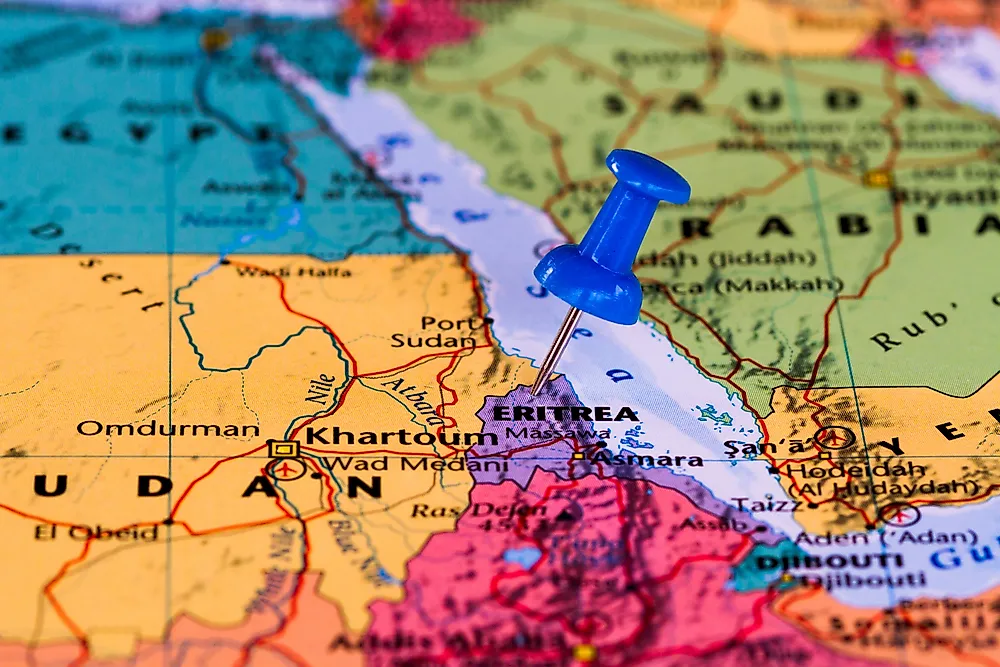Which Countries Border Eritrea?

Eritrea is an African nation that is located along the Red Sea. The nation’s 1388 mile coastline along the Red sea bears strategic significance and has contributed immensely to the nation’s history and formation. The toponym of Eritrea is derived from Greek word for the Red Sea Erythra Thalassa and it was first adopted in 1890 for the Italian Eritrea. The Eritrean coast had been used over the region’s long history as an entry point for Islam, Christianity, and great empires and powers such as the Egypt, Ottoman and Italian Empires which were eager to exploit the ports for the coffee, gold, and slave trade.
Eritrea’s Neighbors
Eritrea is bordered to the south by Ethiopia, to the west by Sudan and the east by Djibouti. The nation has had a long and hostile relationship with its neighbors with some such as Ethiopia claiming the territory as a means to gain access to the sea. Before the arrival of the Italians, the territory which Eritrea currently lies on had its borders defined by various civilizations and kingdoms that ruled the area. Some of the civilizations that resided in the area include Gash Group, Punt, Kingdom of D’mt, Ona Culture, Medri Bahri, Kingdom of Aksum, Aussa Sultanate and Habesh Eyalet.
Demarcation Of Eritrea’s Current Boundaries
The Italian Empire defined Eritrea's current boundaries. In 1880, the Italians arrived in the present day Eritrea and following the death of the Ethiopian Emperor Yohannes IV, and the Italian General OresteBaratieri helped establish Eritrea as an Italian Colony without much resistance. The new territory was cemented by the Treaty of Wuchale in which King Menelik who ruled the Ethiopian Kingdom to the south recognized Italy’s claim to the lands in exchange for European arms and finance. King Menelik’s defeat of rival Kings and accession to the Emperor of Ethiopia formalized the agreement.
The Eritrea-Ethiopia Border History
Eritrea and Ethiopia currently share a 566.6-mile border. The initial relationship along the border of present-day Eritrea and Ethiopia to the south was without much conflict with King Menelik II leveraging the Italian claim to the north to his advantage to accede to the Emperor’s throne in Ethiopia. The coexistence was however short-lived following the outbreak of the Italo-Ethiopian war that lasted between 1895 and 1896. The conflict was initiated by the disputed treaty that had initially helped the Italians claim present-day Eritrea. The Italian colonizers claimed that the treaty stipulated that Ethiopia was an Italian protectorate. Emperor Menelik II opposed the claim. The Italians were subsequently defeated by Ethiopia which had assistance from Russia with which it shared a common Orthodox connection at the battle of Adwa. The defeat forced Italy and its allies to retreat into Eritrea. The victory made Ethiopia the only African nation to have defended its independence from colonial powers.
Ethiopia’s Absorption Of Eritrea
Following the defeat of Italy during World War II by the British invading from Sudan with the help of Ethiopian forces, the Emperor of Ethiopia Haile Selassie sought claim to its northern neighbor with the help of the US in a bid to gain access to the sea. A UN decision in 1950 declared that Eritrea would become part of its southern neighbor Ethiopia from 1952.
Re-establishment Of Eritrea’s Borders
In 1958 the ELM (Eritrean Liberation Movement) was formed to oppose Ethiopia governance and was later succeeded by the ELF ( Eritrean Liberation Front) which started Eritrea’s struggle for Independence, the war lasted 30 years with the successor of the ELF, EPLF ( Eritrean People’s Liberation Front) winning the war. A referendum on Eritrea’s Independence was later held in 1993.
The Eritrean-Ethiopian Border War
Following the independence of Eritrea, the governments of both Eritrea and Ethiopia could not agree on the border lines. Eritrea then invaded Ethiopia in 1998 with the aim of seizing the Badme region resulting in a war between the two nations. The war quickly escalated to include air strikes that caused casualties in respective nations. The war lasted until the year 2000 and was followed by occasional border clashes. Peace was finally achieved in the year 2018 at the Eritrea-Ethiopia Summit. Years of war resulted in significant border changes with Ethiopia occupying territory it had won during the war and ceding the Badme region to Eritrea in 2018, ultimately leading to the end of the 20-year war.
Djibouti And Eritrea
The two nations share a 70-mile border and have had strained relations over the years. The current boundary between Eritrea and Djibouti is derived from a boundary agreement established in the year 1900. The agreement indicated that the boundary would start at Ras Doumeira. The agreement, however, did not assign sovereignty to the nearby Doumeira Island and neighboring islets. The boundary had witnessed conflict sometimes including during colonial times when Djibouti was under French rule. Recent conflict over the border was reported in 1996 when Djibouti claimed that Eritrean forces had made a 4.5 mile incursion into Djibouti’s territory. The border also experienced the Djiboutian-Eritrean border conflict in the year 2008 that lasted between June 10 and June 13.
Eritrea And Sudan
Eritrea and Sudan have a 375.9-mile border and have had strained relations over the years with Sudan accusing Eritrea of harboring Sudanese rebels from Darfur and Eritrea accusing Sudan of harboring Eritrean rebels. Sudan recently deployed troops to the border following simmering tensions between the two nations. Both nations, however, maintain that there is a need to pursue positive bilateral relations.
Eritrea’s Neighbor Relations
Eritrea has had rocky relationships with its neighbors with periods of tension and conflict over the years. The country has however in the recent past managed to mend fences by reaching a mediated agreement in 2018 with its longtime rival Ethiopia. The nation has also managed to improve relations with Djibouti. The country has still not reached a mediated agreement with neighboring Sudan. Intergovernmental organizations such as IGAD are helping with mediation between the two nations to reduce tensions and encourage good bilateral relations.











